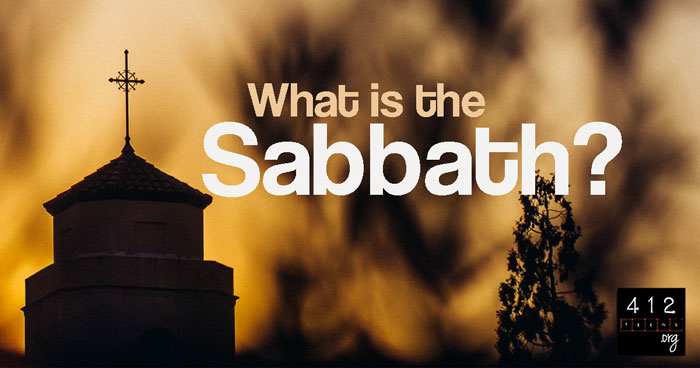What is the Sabbath?

“Six days shall work be done, but the seventh day is a Sabbath of solemn rest, holy to the Lord. Whoever does any work on the Sabbath day shall be put to death. Therefore, the people of Israel shall keep the Sabbath, observing the Sabbath throughout their generations, as a covenant forever. It is a sign forever between me and the people of Israel that in six days the Lord made the heaven and earth, and on the seventh day, He rested and was refreshed.” —Exodus 31:15-17
For about a year, as a young girl, my family went to a Jewish Synagogue while my father struggled to find a home church for us. I was blessed to be able to participate in a Jewish Passover meal, which I have some memories of, and we tried to hold to the Shabbat (Sabbath in English) traditions as well as we could. Some of my favorite memories of childhood are of our family dinners with the Shabbat cloths, candles, and prayers.
Observing the Sabbath is second only to the Ten Commandments in a faithful Jew’s life (Exodus 16:23-29; 31:14-16; 35:2-3; Deuteronomy 5:12-15; Nehemiah 13:15-22; Jeremiah 17:21-27). Because of the wording of Genesis, “Evening came, morning followed, the first day,” Jews start their days at sunset, not sunrise. So, on Friday, they would do their preparations for the following day, then settle in to rest at sunset. Fiddler on the Roof was one of the first mainstream forms of media to beautifully portray the Jewish lifestyle with wit and humor and reverence.
However, contrary to popular belief, the Sabbath is not a day of unnatural quantities of prayer and worship. Faithful Jews prayed at least three times a day every day already, so while there were a few special Sabbath prayers, the whole day wasn’t dedicated to prayer as many assume. There were two commands given for the Sabbath: Zakhor and Shamor: to Remember and to Observe.
Zakhor: To Remember
“Remember the Sabbath day to sanctify it...” —Exodus 20:8
In Jewish tradition, “remember” doesn’t just mean to think back on something. It means to enter into the mystery fully. So, by resting, the observer acknowledges the power of the Creator and that He, too, set aside a day for rest. It is also a remembrance of their deliverance from slavery. While slaves, they had no choice but to work seven days a week, but God took them out of slavery and gave them the command to rest, to remember (Deuteronomy 5:15).
Shamor: To Observe
“Observe the sabbath day to sanctify it...” — Deuteronomy 5:12
The Sabbath was a day of no work, but there are lots of misconceptions about what "work" means in this context. It’s not a day of no work whatsoever, but a day of no needless work, a day of no creative work. So, a farmer would still get up to milk his cows and feed his chickens. A mother would still tend to her children. The Rabbi would still lead prayers on the Sabbath. But no one would dare make purchases or plow or weed or even light fires on the Sabbath. "Work" doesn’t mean those things which are necessary for life, which is why Jesus chastised the Pharisees for getting after his hungry disciples when they picked wheat to eat when they had none (Matthew 12:1-8). Things meant to save a life were also permitted, which is why Jesus healed on the Sabbath (Mark 3:1-6). But all other work was prohibited.
Orthodox Jews, Messianic Jews, and many other Christians still observe the Sabbath day on Saturdays, though some Christians observe it on Sunday instead. Many Christians churches set aside Sundays as a day of worship, in celebration of Christ’s resurrection, which occurred on a Sunday (Matthew 28:1; Mark 16:2; Luke 24:1; John 20:1). That said, it is important to note that the Bible gives us no specific day we must set aside for worship, so the day churches choose to hold worship services is a matter of preference.
The Sabbath is a beautiful Jewish tradition meant to remind us that we are set aside and different than the world. As Christians, we have freedom to observe the Sabbath as a day of rest or to choose any day on which to worship the Lord (Romans 14:5-6; Colossians 2:16). May we choose to worship and serve Him continually, every day, not on just one special day.


TL;DR
The Sabbath is a beautiful Jewish tradition meant to remind us that we are set aside and different than the world. The Sabbath was a day of setting aside needless and creative work, excepting things which are necessary for life. This special day was commanded by God as a remembrance of His day of rest after Creation and of the Jews' freedom from slavery. As Christians, we have freedom to observe the Sabbath as a day of rest or to choose any day on which to worship Him (Romans 14:5-6; Colossians 2:16).

Writer: Brianna
Brianna is a manager at her favorite childhood bookstore. She is likely to be found curled up with a book and her black cat, Bear, talking to a stranger, dancing outside in a thunderstorm, singing Disney songs while making cookies, or snuggling her best friend's baby while drinking coffee. Her heart is fueled by the desire to help people find their unique wings and use them in whatever capacity God has created them for. She is passionate about seeing and finding Christ in the secular world wherever she can.
